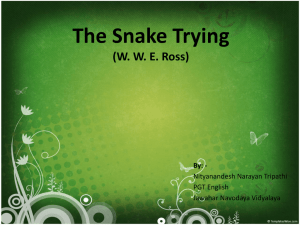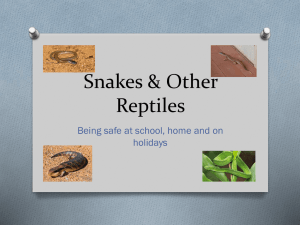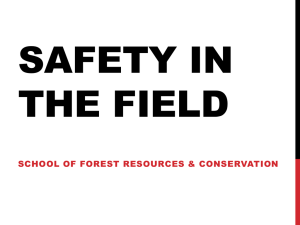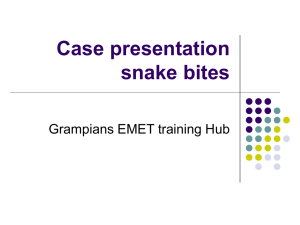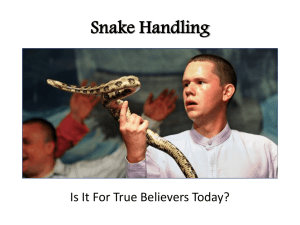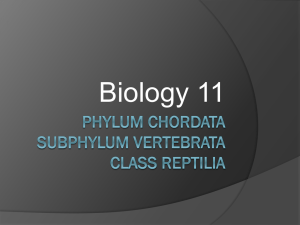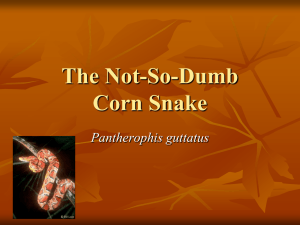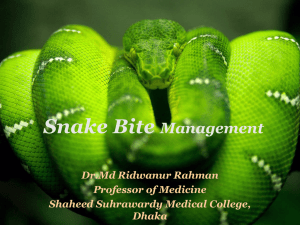Textual Evidence 3
advertisement
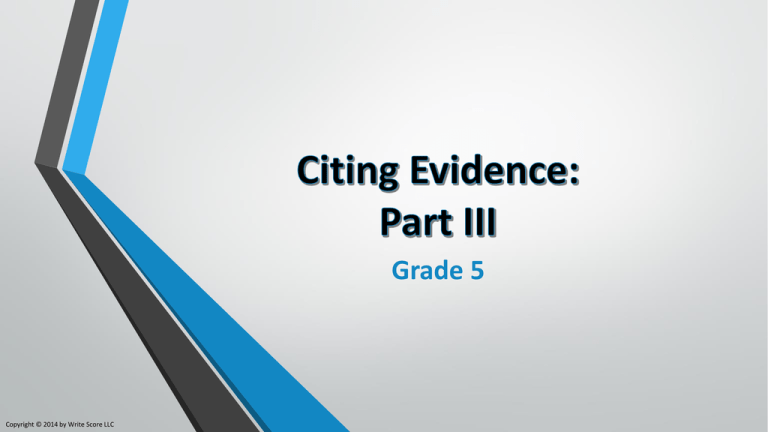
Grade 5 Copyright © 2014 by Write Score LLC Let’s Review: What is Text Evidence? • Text evidence is necessary when answering questions about a text. • Text evidence includes facts or quotes taken from the text that support your answer. • Text evidence should be cited. • Citing text evidence gives credit to the author or source that provided the information. Citing Evidence: Give Text Evidence: o In the text, “Black Mambas”,… o o According to the passage, “The Coral Snake”,… o o One example from the text, “Black Mambas”,… o o The author of “The Coral Snake” states… The author, Carli Hayer, wrote… The illustration in “The Coral Snake” shows… One example on page ___ of “Black Mambas” is… Citing Evidence: (continued) Give MORE Text Evidence: o The text also states… o Another example from the text is… o The author also wrote… Black Mambas By Carli Hayer The black mamba is considered by many to be the world’s deadliest snake. Black mambas are fast, nervous snakes. They are easily threatened, very aggressive, and their venom is deadly. Black mambas live in the grasslands and rocky hills of Africa. They are one of the fastest snakes in the world. They can slither across the ground at speeds of up to 12 miles per hour. Black mambas are the longest venomous snake in Africa and can grow up to 14 feet in length. Black Mambas (continued) By Carli Hayer The skin of a black mamba is gray-green, but the snake gets its name from the inside of its mouth. When threatened, the black mamba will open its mouth and show the dark blue-black color inside. Black mambas are shy. These huge snakes will almost always try to escape when confronted. When the snake is unable to get away from whatever is threatening it, it will attack. First, the snake will raise its head high off of the ground. Then it will spread open its neck flap, open its mouth, and hiss. If this doesn’t scare off its attacker, the black mamba will strike. Black Mambas (continued) By Carli Hayer When the black mamba strikes, it strikes over and over again. With each strike, it injects large amounts of venom into its attacker. Today, there is an antivenom that can save the victim of a black mamba bite. Before this antivenom, a bite from a black mamba was 100 percent fatal. The victim usually died within 20 minutes. Deaths from black mamba bites are still frequent, as the snake lives in remote areas where the antivenom is not readily available. Question #1: According to the article, what are the black mambas defining characteristics? Black mambas are very large snakes. According to the article, “Black Mambas”, the black mamba can grow to be 14 feet long. Black mambas are fast, too. The text states that they can slither across the ground at about 12 mph. Black mambas are greygreen. They get their name from the blue-black color inside their mouths. The article also states that the black mamba is one of the most deadly, venomous snakes in the world. The Coral Snake By Lili Pabst “Red touch yellow, kill a fellow…red touch black, friend of Jack.” This may sound like a simple rhyme, but it isn’t. It is actually a warning for people who stumble upon yellow, black, and red snakes. This rhyme describes the skin patterns of two similar looking, but very different snakes. If the red band is touching the black band (and not the yellow band), it is most likely the nonvenomous scarlet king snake. However, if the red band on the snake’s skin is touching the yellow band (and not the black band), the snake is most likely a deadly coral snake! The Coral Snake (continued) By Lili Pabst A bite from the coral snake can be deadly. At first, there may be little to no pain or swelling. This lack of pain can often cause the bitten person to assume that all is well. However, symptoms of a coral snake bite may not start to show until 12 hours after the bite occurs. Once the venom begins working, it disrupts the connection between the brain and the muscles. This causes slurred speech and double vision. The bite victim may also experience muscular paralysis, the loss of muscle movement. This muscular paralysis can cause the bite victim to stop breathing or have a deadly heart attack. In order to avoid experiencing any of these horrible reactions, bite victims should seek medical help immediately. The Coral Snake (continued) By Lili Pabst Coral snakes live in wooded, sandy, and marshy areas, and spend most of their lives burrowed underground or in leaf piles. They only bite humans when handled or stepped on. The coral snake must chew on their victim to fully inject its venom. Most bite victims don’t stay still long enough for the snake to chew, so most bites to humans don't result in death. In fact, no deaths from coral snake bites have been reported in the U.S. since an antivenom was released in 1967. Answer the Questions. Use Sentence Starters and Text Evidence to Support Your Answer. Question# 1: Why is it important to seek help immediately if you think you have been bitten by a coral snake? Use evidence from the text to support your answer. Continue Answering the Questions… Question# 2: Why don’t the majority of coral snake bites result in death? Use evidence from the text to support your answer. Question# 3: How does the rhyme help identify the deadly coral snake from other nonvenomous snakes? Use evidence from the text to support your answer.
